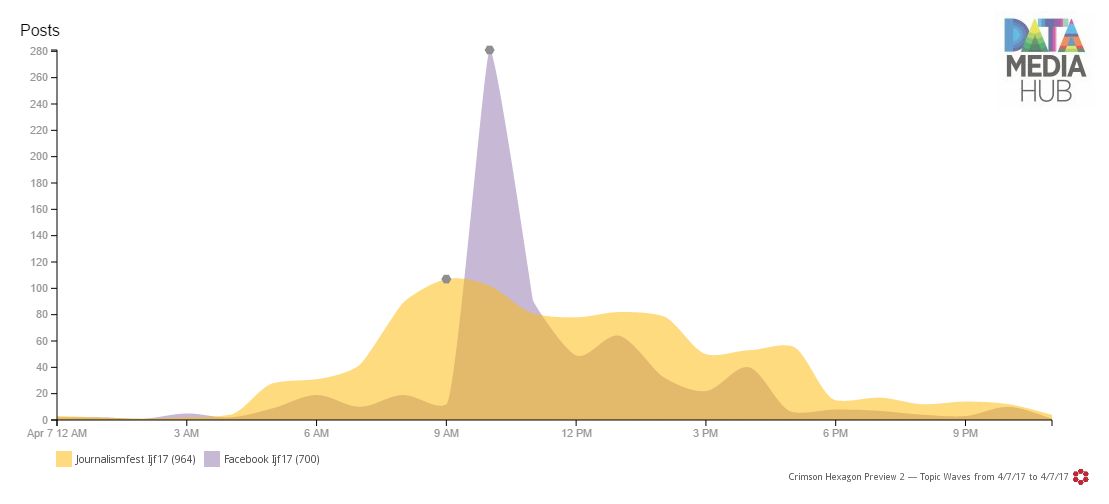Mentions of the Festival on social media remain at the same levels of yesterday. During the first three days together, 20000 mentions were recorded on the different social channels monitored[*], for a total of 251 millions of potential impressions.
The highest peak in terms of intensity was reached around noon, when Adam Mosseri, Vice President of News Feed at Facebook, talked about the functioning of the algorithm that regulates the feed and posts’ visibility. Afterwards, Jeff Jarvis answered questions from the participants, who could ask their questions either directly in the room or on Twitter using#ijf17facebook.
The account of the Vice President of News Feed at Facebook on Twitter @mosseri was the most mentioned during the day (after @journalismfest of course). Observing the topics that received the most attention during the day, it results that #ijf17facebook reached a peak around 12. It was mentioned 700 times, a bit less than the Festival with@journalismfest and #ijf17 (964 mentions), which remain the most used throughout the day, as the infographic below shows.

Giovanni Boccia Artieri published the most popular reflection on “fake news” and the role of social media. He wrote on Facebook that «the repressive solutions to fake news from platfroms and third parties are a bandage that tries to stop the bleeding from a cut that we inflicted ourselves and a useless pseudo-technical answer to a cultural problem».
DataMediaHub proposed something similar conceptually even before the debate. As a reaction to the initiative organised by Facebook in 14 countries, among which Italy, it wrote: «These are positive initiatives, however I believe that they won’t have a big impact on the phenomenon. I think it’s quite unlikely that the majority of people will start adopting “virtuous” behaviours towards it. I also think that it’s a mistake to delegate to Facebook a role that should be taken up by media, that would lose even more relevance».

#Regenileaks was the top hashtag besides the Festival’s official one. It emerged during thepanel organised to draw conclusions from the work carried out by l’Espresso. The magazine created RegeniLeaks, a web platform through which a team, composed by journalists and hackers, gathered information and complaints on human rights violations committed in Egypt by the secret services. The future of whistleblowing as a method of investigation was also discussed during this panel.
The three accounts that produced the largest volumes of posts on social media were Social Reporters, an interesting initiative both in terms of journalistic narration and of the journalists’ auto-entrepreneurship, @ArturoMag50PG, the account of the “Circolo Magnifici Cinquantenni Perugia. Arturi brizzolati”, and @FestivalStorie1, Twitter profile of the students at the Scuola di Perugia at the International Journalism Festival, that was already mentioned in the pre-Festival analysis published on the first day of the event.
The word cloud below sums up the key words, the topics and the accounts that received the most participation on Friday 7 April.

Lastly, the tweet among the posts published on the Festival’s official channels that received the largest engagement was the one informing about the platform to follow the events on streaming.
The publication on Facebook that received the highest engagement yesterday was the post about the show with Marco Travaglio.


